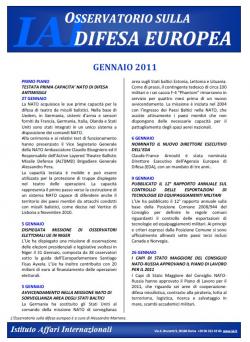Observatory on European defence, July-August 2004

July 2004
Dutch Presidency of the European Union - ESDP Programme
The Dutch Presidency presented its work programme for the second half of 2004.
The outstanding priorities in the field of Security and Defence Policy concern:
- strengthening the European Union’s means to fight international terrorism
- increasing the effectiveness of the policy to counter proliferation of weapons of mass destruction
- deepening of relations and coordination with NATO
- undertaking greater responsibility in stabilizing the Balkans, taking over the NATO SFOR mission
- further developing, both qualitatively and quantitatively, the European Union’s intervention capabilities (military, police and civil) in crisis management, taking advantage of the European Defence Agency.
The Presidency officially submitted the Programme to the General Affairs and External Relations Council on 12-13 July 2004.
12-13 July 2004
General Affairs External Relations Council - Iraq, Althea, Sudan, Afghanistan, Defence Agency, Galileo, Gendarmerie, Defence Agency, Battle Groups
The agenda of the General Affairs and External Relations Council (GAERC) dealt with several topical issues.
The attention of European countries is focused on the worsening crisis in Iraq. In this context, following UNSC Resolution n.1546 of 19 July, the Justice and Home Affairs Council decided to reduce the embargo on armaments against Iraq.
In the meantime, on 30 July, NATO, after intense discussions among its members, reached a general agreement to launch a training mission for local troops; an initial group of operators was sent in August; the development of NATO involvement in Iraq will be the topic of further discussions in September.
The Iraqi Prime Minister was invited to attend the meeting of European ministers on 5 November.
The Council adopted the Joint Action launching the Althea operation in Bosnia-Herzegovina, taking over from the NATO SFOR mission.
The operation will be conducted in the framework of the ‘Berlin+’ agreement between the European Union and NATO; the EU Operation Commander is the Deputy Supreme Allied Commander for Europe (Admiral Feist, D-Saceur), while the EU Force Commander is British Major General Leakey. The costs (common costs, amounting to 71.7 million euro) will be shared on a GNP basis (the so-called ‘Athena’ mechanism).
Cooperation between NATO and the European Union was dealt with in discussions on 15 July between EU HR Solana and NATO Secretary General de Hoop Scheffer.
The Council lobbied heavily with the Sudan government on the serious humanitarian situation in the Darfur region caused by guerrilla warfare. Subsequently, on 26 July, the GAERC decided to send observers, which took place on 3 August. Adoption on 30 July of UNSC Resolution n.1556 might lead to military intervention in the area.
The Council (following the decision of 14 June) adopted a Joint Action establishing a European Defence Agency, approving a budget of 1.9 million euro. On 30 July, Nick Witney from the UK and Hilmar Linnenkamp from Germany were appointed Chief Executive and Deputy Chief Executive, respectively.
The Council adopted a decision to establish an Authority for management of security problems related to the Galileo satellite system; discussions concerning the participation of third countries - including Israel, with which an agreement was reached on 13 July - were carried out.
In Afghanistan, preparations continue for the elections, for which the European Commission has allocated additional funds. On 9 August the Eurocorps - a multinational formation made up of several European countries - took over command of the NATO ISAF mission.
-
Details
Roma, Istituto affari internazionali, 2004 -
Issue
04/07


